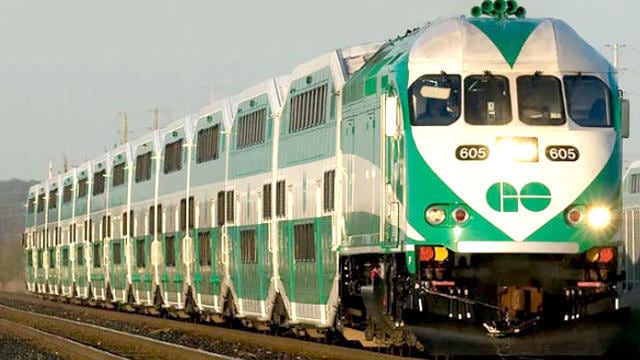Federal Government Doles Out Cash for GO Transit and 51 Projects in Mississauga
Published April 1, 2017 at 2:58 pm

We at Insauga have written extensively about all-day, two-way GO trains as part of the public transit mix in Mississauga, Peel Region and the rest of the Greater Toronto Area (GTA). The need for Regional Express Rail (RER) as well as rail electrification is essential to providing some concrete alternatives to the automobile. But it’s ludicrous to believe that cities could have paid for such massive infrastructure projects with their limited tax base or by cutting delivery of essential services. A new federal government got elected on a promise to invest in public transit, and we have been waiting for some time to see whether it would fund something like RER.

Last week, the reality of RER was taken one step closer to becoming reality. Prime Minister Justin Trudeau, who only visited Brampton and Mississauga mere weeks ago, was in Toronto to announce that the federal government would provide up to $1.8 billion for the GO Transit Regional Express rail project in the Greater Golden Horseshoe Area through the Building Canada Fund. Along with their contributions, the federal and the provincial governments are pitching in $4.4 billion to the rail project that will add track and parking capacity and renovate stations in and around Toronto.
Trudeau claimed that this investment will be the single largest transit project in which the federal government has ever invested. Also in attendance were Brampton Mayor Linda Jeffrey, Mississauga Mayor Bonnie Crombie, Premier Kathleen Wynne and a slew of other politicians from the three levels of government.
With her popularity hitting rock bottom and recent polls showing her Liberals will be severely humbled at the polls if an election were held today, Wynne was no doubt ecstatic in the funding announcement from Trudeau, commenting that with the additional funding weekly trips across the GO rail network will go from 1,500 today to 6,000 by the year 2025.
Besides announcing the money for the RER, Trudeau also announced some 300 additional projects were to be funded through the Public Infrastructure Fund. Fifty-one of those projects are located in Mississauga, and the entire list of projects across Ontario can be seen here. The list of Mississauga projects are somewhere between the list for London and Niagara Falls, but here are some of the highlights:
- IT Project for Switches and Routers for Transit and Traffic Voice and Data Communications to Support the New Network Fiber Design Required for the Advanced Transportation Management System (ATMS) – $225,998
- IT Project for Wireless Infrastructure for Transit and Transit Rider Broadband Connectivity – $150,665
- Bus Communication Gateway Replacement on all MiWay Fleet – $1,506,654
- Installation of 100 additional MiWay Transit Shelters – $1,255,545
- Replacement of Asphalt with concrete Transit Bus Landing Pads at 75 high traffic bus stops – $502,218
- Transit Bus Seat Modification on 84 buses – $753,327
- Transit Capital Bus Engine Maintenance on up to 280 buses – $1,888,008
- Transit Capital Bus Maintenance – Major Component Rehabilitation/Replacement on up to 280 buses – $3,610,948
- Etobicoke Creek Trail reconstruction – trail resurfacing, signage, trail markers and trail user-count technology – $1,135,013
- Acquisition of up to 29 – 60 foot buses to replace aging buses – $13,855,135
- Lakeshore Road Transportation Master Plan – $132,755
- Pedestrian & Cyclist Access to Mississauga’s Transitway & GO Transit Stations – $3,757,047
- Acquisition of up to 10 new transit buses to increase Service Hours – $2,923,222
- Acquisition of up to 51 – 40 foot buses to replace aging buses – $14,776,036
In total, Mississauga will receive $58 million in investments for these 51 separate projects, and Mississauga Mayor Bonnie Crombie in response issued this statement to the funding announcement, calling it a “game changer.”
The Prime Minister also responded to a question from a reporter asking why he cancelled the public transit tax credit. Trudeau responded that he believes in ‘evidence-based’ decision making, and from what he has seen, the tax credit did not result in increased transit ridership as it was originally intended. Nor in the Prime Minister’s view did it help low income people who rely in a greater proportion on public transit.
It seems this federal government is looking towards using their leverage and available capital to do big infrastructure projects, as opposed to less dramatic moves made by the previous government, or relying on incentives to spur human behaviour to use public transit that is, as many commentators have put it, less than adequate in a growing region.
Follow me on Twitter at @thekantastic
insauga's Editorial Standards and Policies advertising





